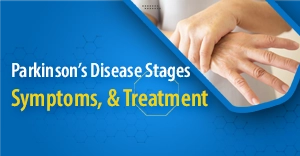Comprehensive Care for Parkinson’s at Medica
Parkinson’s disease develops when the brain’s nerve cells (known as neurons) gradually deteriorate and die. Dopamine, a chemical messenger that provides information to the part of your brain that controls movement and coordination, is normally produced by nerve cells. A decrease in the amount of dopamine produced in the brain causes aberrant activity in the brain, resulting in movement disability and other symptoms in Parkinson’s disease. The therapy is mostly medical and rehabilitative in nature. Medicines are primarily designed to increase the availability of dopamine at brain nerve terminals, which regulates motor coordination. In the advanced stage, the function of family or social support is critical. Patients with Parkinson’s disease are more likely to develop injuries as a result of repeated falls.
Free Doctor Assessment
Symptoms of Parkinson’s Disease
When nerve cells in the basal ganglia, a part of the brain that controls movement, become damaged or die, Parkinson’s disease develops. These nerve cells, or neurons, normally create dopamine, an important brain neurotransmitter. When neurons die or become damaged, they produce less dopamine, resulting in Parkinson’s movement issues. So, most of the signs are apparent and unmissable. Some of the most noticeable and common symptoms of PD are:
- Tremor: A tremor, or shaking, usually starts in one of your limbs, most commonly in your hand or fingers. A pill-rolling tremor occurs when you rub your thumb and forefinger back and forth. When your hand is at rest, it may shake.
- Bradykinesia: Parkinson’s disease slows your mobility over time, making routine tasks more complex and time consuming. When you walk, your steps may become shorter. Getting out of a chair can be challenging. When you try to walk, your feet may drag.
- Rigid Muscles: Muscle stiffness can strike at any time and in any portion of your body. Stiff muscles can be uncomfortable and restrict your range of motion.
- Posture and balance issues: As a result of Parkinson’s disease, your posture may become stooped, and you may experience balance issues.
- Loss of automatic movements: It’s possible that you’ll have a harder time doing unconscious actions like blinking, smiling, or swinging your arms as you walk.
- Changes in Speech: You have the option of speaking softly, fast, slurring, or pausing before speaking. Instead of the regular inflections, your speech may be more monotonous.
- Changes in Handwriting: It may become difficult to write, and your writing may appear small as a result.
Other symptoms may include Decreased ability to smell, giving off a musky odor,stooped posture, difficulty concentrating and memorizing, experiencing hallucinations, psychosis, and flaky yellow/white scales on the skin.
Stages of Parkinson’s Disease
Parkinson’s can be categorized into five stages depending on the severity of the symptoms.
- Stage 1: This is when Parkinson’s is in its mildest form with negligible or no symptoms at all. If you do have symptoms, they are likely to stay confined to one side of your body and may not affect your daily activities.
- Stage 2: The progression of the disorder to the second stage takes several months, sometimes years. Muscle stiffness, changes in facial expressions and posture are more noticeable at this stage.
- Stage 3: This is when the symptoms become more evident. One is likely to encounter new debilitating symptoms that interfere with basic tasks. Slower movements, balance issues and falls become significant too.
- Stage 4: At this stage, the person will experience significant changes, such as difficulty walking or even standing without assistance.
- Stage 5: The last stage of Parkinson’s is the most advanced one. The symptoms become aggressive and the affected person may need assistance to perform basic tasks. Besides, hallucinations, delusions and confusion are also common.
Causes of Parkinson’s Disease
Although the exact origin of Parkinson’s disease is uncertain, several factors appear to be involved, including:
- Genes: Parkinson’s disease can be caused by certain genetic abnormalities, according to research. However, except in rare circumstances where a large number of family members are affected by Parkinson’s disease, they are unusual.
- Age: Parkinson’s disease affects just a small percentage of young individuals. It usually starts in middle or late life, and the risk grows as you become older. The disease usually strikes people at the age of 60 or older.
- Sex: Men are more prone than women to develop Parkinson’s disease.
- Environmental Triggers: Certain chemicals or environmental factors may raise the likelihood of developing Parkinson’s disease later in life, but the risk is modest.
Many alterations have also been observed in the brains of persons with Parkinson’s disease, while the cause of these changes is unknown. Among the changes are:
- Exposure to Chemicals: Continuous exposure to herbicides and pesticides may raise your risk of Parkinson’s disease by a small amount.
- Lewy Bodies: Microscopic signs of Parkinson’s disease are clumps of specific chemicals within brain cells. These are known as Lewy bodies, and scientists believe they hold a key to understanding the etiology of Parkinson’s disease.
- Alpha-synuclein found within Lewy Bodies: Although several compounds are discovered in Lewy bodies, scientists believe that alpha-synuclein, a naturally occurring and widely distributed protein, is one of the most crucial (a-synuclein). It’s found in clumped form in all Lewy bodies, which cells can’t break down. This is a hot topic among Parkinson’s disease researchers right now.
Diagnosis
Symptoms of Parkinson’s disease can be caused by a variety of conditions. Parkinsonism is a term used to describe people who have Parkinson’s-like symptoms that are caused by something other than Parkinson’s disease. While these illnesses may first be misdiagnosed as Parkinson’s disease, certain medical tests, as well as pharmacological therapy response, can assist in identifying them. Because many diseases have similar symptoms but require distinct treatments, it’s critical to get an accurate diagnosis as soon as possible. There are currently no blood or laboratory tests available to diagnose Parkinson’s disease in nongenetic instances. A person’s medical history and a neurological examination are used to make a diagnosis. Another key feature of Parkinson’s disease is improvement after starting therapy.

Minimally Invasive
Surgery

World Renowned
Experts
EMI Facility
Available

Covid Safe
Environment
Treatment
Although there is no cure for Parkinson’s disease, medications, surgical treatment, and other therapies can help to alleviate some of the symptoms. Parkinson’s patients should never stop taking their meds without first consulting their doctor. Stopping the medicine suddenly might have major consequences, such as being unable to move or having trouble breathing. Deep brain stimulation, or DBS, may be useful for persons with Parkinson’s disease who do not respond well to treatments. DBS is a medical treatment in which electrodes are surgically implanted in a portion of the brain and are connected to a tiny electrical device implanted in the chest.









